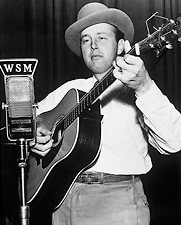Monroe, Bill (1911-1996), was an American singer, musician, bandleader, and songwriter. He became known as the “father of bluegrass music.” Bluegrass is a style of country music played on acoustic stringed instruments such as the banjo , mandolin , fiddle , guitar , and bass . It blends older forms of Southern folk and country music with elements of blues , gospel , and jazz .

Bluegrass music takes its name from the Blue Grass Boys, a band Monroe formed in 1939. Monroe composed instrumental works and both religious and secular (nonreligious) songs. He played the mandolin and sang in a distinctive high tenor voice.
William Smith Monroe was born on Sept. 13, 1911, in Rosine, in rural western Kentucky. He got his first performing experience playing guitar for Arnold Schultz, an African American who played fiddle at local square dances. Another important influence was his uncle, Pendleton Vandiver, another fiddler.
Monroe was orphaned by the age of 16, and in 1929 he moved to the Chicago area where some of his older brothers and sisters were living. He began performing with his brother Charlie as the “Monroe Brothers,” featuring close harmony vocals, supported by Charlie’s rhythm guitar and Bill’s mandolin solos.
In 1935, the brothers moved to the Southeast and gained great popularity, primarily in North and South Carolina, with live radio performances and personal appearances. Between 1936 and 1938, the Monroe Brothers recorded 60 songs for RCA. The brothers split up in 1938 and each formed his own band. In 1939, Bill organized the Blue Grass Boys, named in honor of Kentucky, the Blue Grass State.
Monroe and the Blue Grass Boys first played on the “ Grand Ole Opry ” radio program in 1939. The band’s most popular early songs included “Mule Skinner Blues” (1940) and “Kentucky Waltz” (1945).
Perhaps the most influential version of the band included Lester Flatt on guitar, Earl Scruggs on banjo, Chubby Wise on fiddle, and Howard Watts on bass. This band performed from 1946 to 1948. They recorded such bluegrass standards as “Blue Moon of Kentucky” (1946), “Molly and Tenbrooks” (1947), and “It’s Mighty Dark to Travel” (1947). Later recordings included “Uncle Pen” (1950), “Raw Hide” (1951), and “On and On” (1954). Monroe’s 1988 album Southern Flavor won the first Grammy Award for bluegrass music. He was elected to the Country Music Hall of Fame in 1970. Monroe died on Sept. 9, 1996. In 1997, Monroe was inducted into the Rock and Roll Hall of Fame as a performer who had an early influence on rock music .
